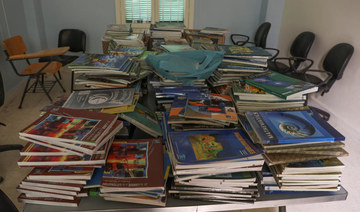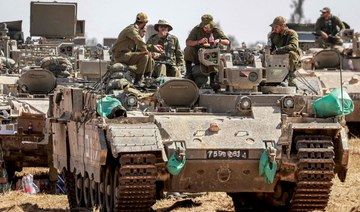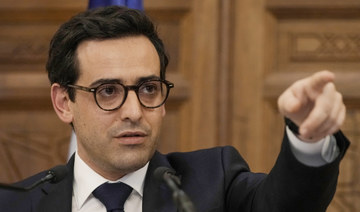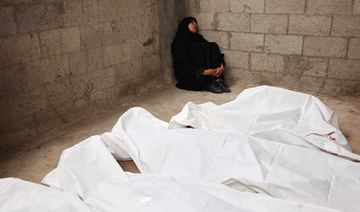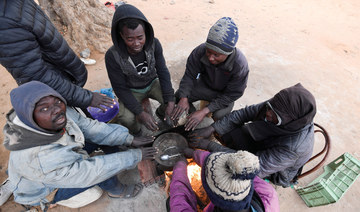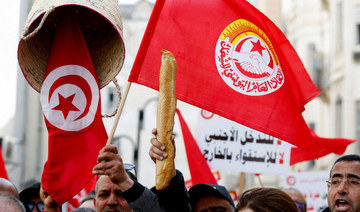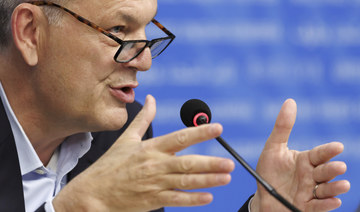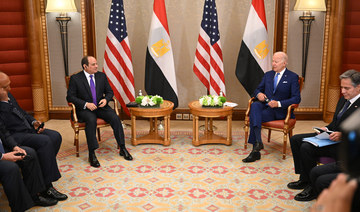BEIRUT: Lebanon plans to slash its official exchange rate, replacing the 1,507 per dollar rate adopted 25 years ago with a rate of 15,000 in a step toward unifying numerous exchange rates, the finance minister told Reuters on Wednesday.
After saying the move would come into effect on Nov. 1, the ministry later said the step was conditioned on the approval of a plan to address the crisis, which is under discussion in parliament.
The Lebanese pound has plunged by more than 95 percent from the official rate since Lebanon fell into financial crisis three years ago, with dollars currently changing hands at around 38,000 on a parallel market.
“The goal is for there to be a unification of the exchange rates in Lebanon,” Finance Minister Youssef Khalil said, calling the decision a “fundamental step” in that direction. The step would come into force on Nov. 1, the ministry said.
“Today, Lebanon has entered a new phase and is no longer using an official US dollar exchange rate that makes no sense ... Now we have one that is useful, based on which you can steer the economy toward a better situation,” he said.
The decision — which Khalil said was agreed with central bank governor Riad Salameh — marks a milestone in the meltdown that has plunged swathes of the population into poverty in the worst crisis since the 1975-90 civil war.
Salameh told Reuters via text message that the decision “will require time before it is implemented.
“We have to wait before anticipating further moves,” he said.
Ruling politicians have so far taken scarcely any action toward tackling the crisis.
Unifying the numerous exchange rates operating in the country is one of several conditions set by the IMF for Lebanon to secure a badly needed aid package. The Fund has said this is crucial to boosting economic activity.
The IMF said last week progress in implementing reforms remained very slow, with the bulk yet to be carried out.
In addition to official and parallel market exchange rates, authorities have created several others during the crisis, including unfavorable rates applied to withdrawals of Lebanese pounds from hard currency deposits in the frozen banking system.
Khalil noted that unification of the exchange rates was an IMF demand, but added it was also something that must happen regardless, saying the government was taking a gradual approach.
On Monday, the parliament approved a state budget that applied the 15,000 rate to customs taxes — a step aimed at boosting state revenues. Khalil said this had paved the way for the decision he announced on Wednesday.
He said discussions were under way with stakeholders including banks and depositors on the implications of the decision and how it would be applied. “We have taken this month to explain to everyone carefully what is happening,” he said.
Financial authorities would also work to contain any social or financial repercussions, especially regarding housing loans and “help the private sector on an orderly transition to the new exchange rate,” a ministry statement added.
Several economists contacted by Reuters said there were not enough details to comment on the move.
RECOVERY PLAN
Lebanon’s crisis was caused by decades of profligate spending by a state riddled with corruption and waste, together with unsustainable financial policies.
Depositors have paid a big price, mostly unable to access dollar savings or forced to make withdrawals in pounds at unfavorable rates.
A recovery plan that would address some $72 billion in losses in the financial system has yet to be finalized.
Asked by Reuters how the decision would affect depositors, Khalil said “there should not be any impact” while adding that this was under study.
Khalil said an update to a draft government financial recovery plan was being discussed in parliament.
“It needs time,” he said, adding that Wednesday’s decision would reflect positively on the plan “because it is helping economic activity and increases revenues for the state.”
Khalil said money coming into Lebanon was avoiding the banking sector due to distortions in the exchange rate and a lack of confidence, which he said he hoped would be assuaged by the unification of rates.
Lebanon to slash official exchange rate from Nov. 1, finance minister says
https://arab.news/7c2u8
Lebanon to slash official exchange rate from Nov. 1, finance minister says
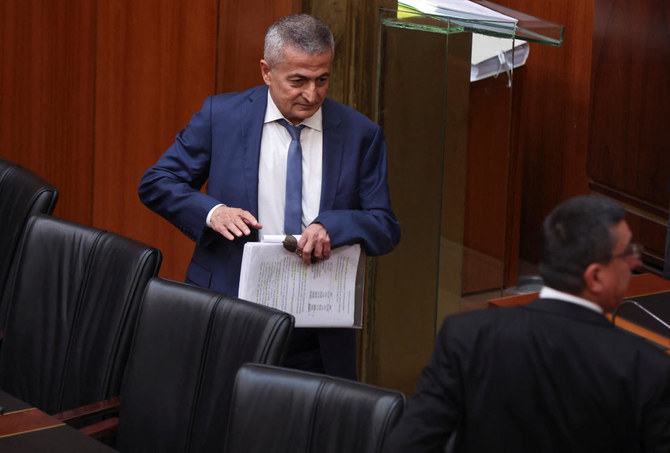
- After saying the move would come into effect on Nov. 1, the ministry later said the step was conditioned on the approval of a plan to address the crisis
- “The goal is for there to be a unification of the exchange rates in Lebanon,” Finance Minister Youssef Khalil said
French foreign minister heads to Cairo as truce talks intensify
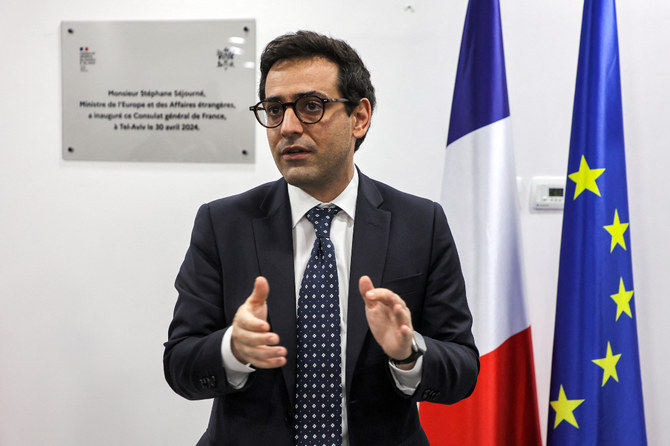
- Diplomatic efforts toward securing a ceasefire were intensifying following a renewed push led by Egypt
- France has three nationals still held hostage by Hamas after the group’s assault on Israel in October
TEL AVIV: France’s foreign minister will travel to Cairo on Wednesday in an unscheduled stop during a Middle East tour as efforts to secure a truce between Israel and Hamas in Gaza reach a critical point, a French diplomatic source said.
Diplomatic efforts toward securing a ceasefire were intensifying following a renewed push led by Egypt to revive stalled negotiations between Israel and Hamas, Gaza’s ruling Palestinian Islamist group.
“The surprise visit of the minister is in the context of Egypt’s efforts to free hostages and achieve a truce in Gaza,” the source said.
France has three nationals still held hostage by Hamas after the group’s assault on Israel in October.
Foreign minister Stephane Sejourne’s trip to Egypt follows stopovers in Lebanon, Saudi Arabia and Israel. He will likely want to assess whether those three hostages could be released and how close a deal actually is.
Sejourne, who saw Israeli Prime Minister Benjamin Netanyahu in Jerusalem on Tuesday, said in an interview on Tuesday that there was some momentum toward an accord, but that it would only be a first step toward a long-term ceasefire.
He warned that an offensive in southern Gaza City of Rafah would do nothing to help Israel in its war with Hamas.
Trucks bringing bodies and detainees into Gaza hold up aid says UNRWA
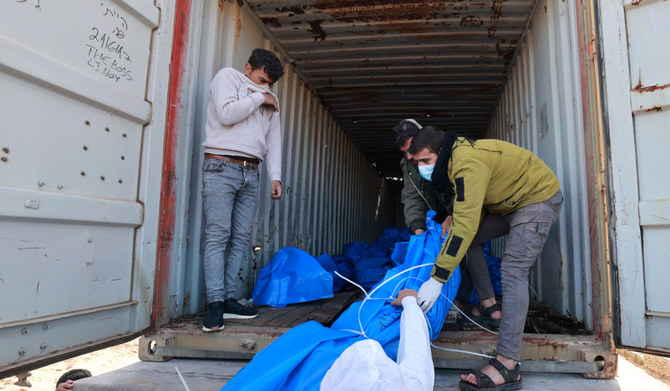
- Israel has killed more than 34,000 Palestinians, according to Gaza’s Health Ministry
- Asked for more details, UNRWA spokesperson Juliette Touma said that Israel had sent 225 bodies to Gaza in three containers since December that were then transported by the UN agency to local health authorities for burial, shutting the crossing temporarily
GENEVA: Trucks bringing both bodies and detainees from Israel back to Gaza through the main crossing point of Kerem Shalom regularly hold up aid deliveries, the head of the UN agency for Palestinian refugees said on Tuesday.
A deepening humanitarian crisis in Gaza has raised pressure on Israel to boost supplies into the enclave to curb disease among the 1.7 million people displaced by the Israeli-Hamas conflict and relieve hunger amid famine warnings from the United Nations.
UNRWA Commissioner-General Philippe Lazzarini told journalists on Tuesday that aid supplies into Gaza had improved in April but listed a series of ongoing difficulties including regular crossing closures “because they (Israel) are dumping released detainees or dumping sometimes bodies taken to Israel and back to the Gaza Strip.”
Asked for more details, UNRWA spokesperson Juliette Touma said that Israel had sent 225 bodies to Gaza in three containers since December that were then transported by the UN agency to local health authorities for burial, shutting the crossing temporarily. She did not have details of the circumstances of their deaths and said it was not UNRWA’s mandate to investigate.
On the detainee transfers, some of which have been previously reported by Reuters, she said that they had been transferred from Israel back to Gaza “dozens of times.”
Israel’s COGAT, a military branch in charge of aid, did not immediately respond to a request for comment. A spokesperson for the Israeli diplomatic mission in Geneva referred questions on the transfers to Jerusalem.
On aid deliveries, he said: “Mr. Lazzarini is deflecting from UNRWA’s own failures and responsibilities. Again today, there was a backlog of more than 150 trucks screened by Israel in Kerem Shalom not picked up by UN agencies.”
Tensions are high between Israel and UNRWA with the former accusing 19 UNRWA staff of involvement in the Oct. 7 Hamas attacks against Israel that killed 1,200 people and prompted the latter’s military campaign in Gaza. Israel’s allegations are being examined by UN investigators although a separate review found Israel has yet to provide evidence for accusations that hundreds of UNRWA staff are members of terrorist groups.
Kerem Shalom is one of just two crossings the UN says is currently open between Gaza and its neighbors Egypt and Israel.
Palestinian authorities have previously said that Israel has returned bodies from the Israeli-Hamas conflict after confirming they were not hostages. They said they were trying to identify them and figure out where they were killed.
Tunisian opposition wants political prisoners freed before taking part in presidential election
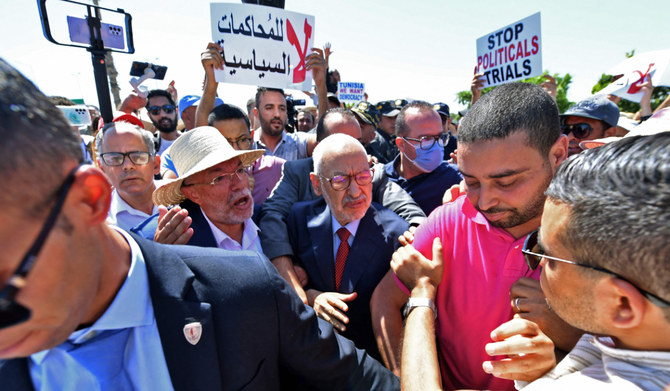
- Ennahdha’s headquarters were shut down a year ago, and its leader Rached Ghannouchi – a former parliament speaker – was sentenced to 15 months in prison on charges of glorifying terrorism
TUNIS, Tunisia: Tunisia’s main opposition coalition said Tuesday it won’t take part in the North African country’s upcoming presidential election unless President Kais Saied’s political opponents are freed and judicial independence is restored.
More than 20 political opponents have been charged or imprisoned since Saied consolidated power in 2021 by suspending parliament and rewriting the country’s constitution. Voters weary of political and economic turmoil approved his constitutional changes in a 2021 referendum with low turnout.
Saied is widely expected to run in the presidential election, likely to take place in September or October. It is unclear if anyone will challenge him.
The National Salvation Front, a coalition of the main opposition parties including once-powerful Islamist movement Ennahdha, expressed concern that the election wouldn’t be fair, and laid out its conditions for presenting a candidate.
They include freeing imprisoned politicians, allowing Ennahdha’s headquarters to reopen, guaranteeing the neutrality and independence of the electoral commission and restoring the independence of the judicial system, according to National Salvation Front president Ahmed Nejib Chebbi.
Ennahdha’s headquarters were shut down a year ago, and its leader Rached Ghannouchi – a former parliament speaker – was sentenced to 15 months in prison on charges of glorifying terrorism. His supporters say the charge is politically driven.
Under the constitutional changes Saied introduced, the president can appoint members of the electoral authority as well as magistrates.
Tunisia’s earlier charter had been seen as a model for democracies in the region.
Tunisia built a widely praised but shaky democracy after unleashing Arab Spring popular uprisings across the region in 2011. Its economic woes have deepened in recent years, and it is now a major jumping off point for migrants from Tunisia and elsewhere in Africa who take dangerous boat journeys toward Europe.
Israeli ground operation in Rafah would be ‘tragedy beyond words’: UN
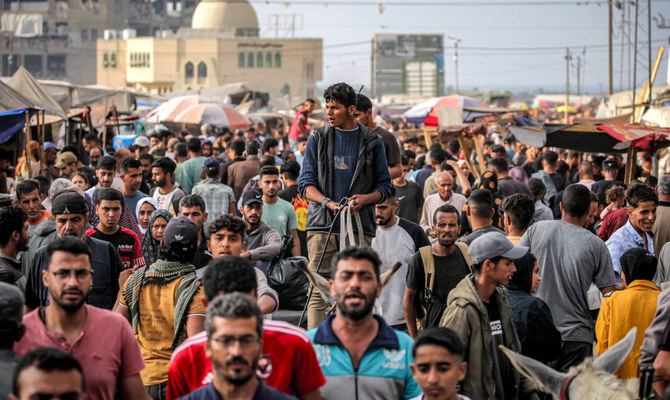
- “The world has been appealing to the Israeli authorities for weeks to spare Rafah, but a ground operation there is on the immediate horizon,” said Griffiths
UNITED NATIONS, United States: A ground operation by Israeli troops in the southern Gaza city of Rafah would be a “tragedy beyond words,” the UN’s humanitarian chief Martin Griffiths said in a statement on Tuesday.
“The simplest truth is that a ground operation in Rafah will be nothing short of a tragedy beyond words. No humanitarian plan can counter that,” Griffiths said, after Israeli Prime Minister Benjamin Netanyahu vowed to launch an offensive on Rafah, which has become a refuge to some 1.5 million Palestinians.
With Hamas weighing a truce plan proposed in Cairo talks with the US, Egyptian and Qatari mediators, Netanyahu vowed to launch the assault on Rafah “with or without a deal.”
Washington has joined calls on Israel from other countries and humanitarian organizations to spare the city for fear an army incursion would lead to massive civilian casualties.
“The world has been appealing to the Israeli authorities for weeks to spare Rafah, but a ground operation there is on the immediate horizon,” said Griffiths.
“For the hundreds of thousands of people who have fled to Gaza’s southernmost point to escape disease, famine, mass graves and direct fighting, a ground invasion would spell even more trauma and death.
“For agencies struggling to provide humanitarian aid despite the active hostilities, impassable roads, unexploded ordnance, fuel shortages, delays at checkpoints, and Israeli restrictions, a ground invasion would strike a disastrous blow.
“We are in a race to stave off hunger and death, and we are losing.”
The war in Gaza started after Hamas’s October 7 attack on southern Israel resulted in the deaths of 1,170 people, mostly civilians, according to an AFP tally of Israeli official figures.
Israel’s retaliatory offensive has killed at least 34,535 people in Gaza, mostly women and children, according to the health ministry in the Hamas-run territory.
Palestinian militants also took some 250 hostages on October 7. Israel estimates 129 remain in Gaza, including 34 believed to be dead.
Why Israel is so determined to launch an offensive in Rafah. And why so many oppose it
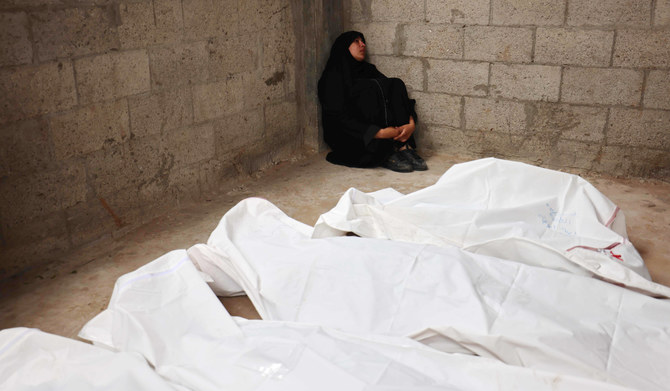
- Israel has killed more than 34,000 Palestinians, according to Gaza’s Health Ministry
- Palestinians live in densely packed tent camps, overflowing UN shelters or crowded apartments, and are dependent on international aid for food, with sanitation systems and medical facilities infrastructure crippled
JERUSALEM: Israel is determined to launch a ground offensive against Hamas in Rafah, Gaza’s southernmost town, a plan that has raised global alarm because of the potential for harm to more than a million Palestinian civilians sheltering there.
Even as the US, Egypt and Qatar pushed for a ceasefire deal they hope would avert an assault on Rafah, Prime Minister Benjamin Netanyahu repeated on Tuesday that the military would move on the town “with or without a deal” to achieve its goal of destroying the Hamas militant group.
“We will enter Rafah because we have no other choice. We will destroy the Hamas battalions there, we will complete all the objectives of the war, including the return of all our hostages,” he said.
Israel has approved military plans for its offensive and has moved troops and tanks to southern Israel in apparent preparation — though it’s still unknown when or if it will happen.
About 1.4 million Palestinians — more than half of Gaza’s population — are jammed into the town and its surroundings. Most of them fled their homes elsewhere in the territory to escape Israel’s onslaught and now face another wrenching move, or the danger of facing the brunt of a new assault. They live in densely packed tent camps, overflowing UN shelters or crowded apartments, and are dependent on international aid for food, with sanitation systems and medical facilities infrastructure crippled.
WHY RAFAH IS SO CRITICAL
Since Israel declared war in response to Hamas’ deadly cross-border attack on Oct. 7, Netanyahu has said a central goal is to destroy its military capabilities.
Israel says Rafah is Hamas’ last major stronghold in the Gaza Strip, after operations elsewhere dismantled 18 out of the militant group’s 24 battalions, according to the military. But even in northern Gaza, the first target of the offensive, Hamas has regrouped in some areas and continued to launch attacks.
Israel says Hamas has four battalions in Rafah and that it must send in ground forces to topple them. Some senior militants could also be hiding in the city.
WHY THERE IS SO MUCH OPPOSITION TO ISRAEL’S PLAN
The US has urged Israel not to carry out the operation without a “credible” plan to evacuate civilians. Egypt, a strategic partner of Israel, has said that an Israeli military seizure of the Gaza-Egypt border — which is supposed to be demilitarized — or any move to push Palestinians into Egypt would threaten its four-decade-old peace agreement with Israel.
Israel’s previous ground assaults, backed by devastating bombardment since October, leveled huge parts of northern Gaza and the southern city of Khan Younis and caused widespread civilian deaths, even after evacuation orders were given for those areas.
Israel’s military says it plans to direct the civilians in Rafah to “humanitarian islands” in central Gaza before the planned offensive. It says it has ordered thousands of tents to shelter people. But it hasn’t given details on its plan. It’s unclear if it’s logistically possible to move such a large population all at once without widespread suffering among a population already exhausted by multiple moves and months of bombardment.
Moreover, UN officials say an attack on Rafah will collapse the aid operation that is keeping the population across the Gaza Strip alive,. and potentially push Palestinians into greater starvation and mass death.
Some entry points have been opened in the north, and the US has promised that a port to bring in supplies by sea will be ready in weeks. But the majority of food, medicine and other material enters Gaza from Egypt through Rafah or the nearby Kerem Shalom crossing — traffic that is likely to be impossible during an invasion.
The US has said that Israel should use pinpoint operations against Hamas inside Rafah without a major ground assault.
After Netanyahu’s latest comments, US National Security spokesperson John Kirby said, “We don’t want to see a major ground operation in Rafah. Certainly, we don’t want to see operations that haven’t factored in the safety, security of” those taking refuge in the town.
POLITICAL CALCULATIONS
The question of attacking Rafah has heavy political repercussions for Netanyahu. His government could be threatened with collapse if he doesn’t go through with it. Some of his ultranationalist and conservative religious governing partners could pull out of the coalition, if he signs onto a ceasefire deal that prevents an assault.
Critics of Netanyahu say that he’s more concerned with keeping his government intact and staying in power than national interest, an accusation he denies.
One of his coalition members, Finance Minister Bezalel Smotrich, said Tuesday that accepting a ceasefire deal and not carrying out a Rafah operation would amount to Israel “raising a white flag” and giving victory to Hamas.
On the other hand, Netanyahu risks increasing Israel’s international isolation — and alienating its top ally, the United States — if it does attack Rafah. His vocal refusals to be swayed by world pressure and his promises to launch the operation could be aimed at placating his political allies even as he considers a deal.
Or he could bet that international anger will remain largely rhetorical if he goes ahead with the attack. The Biden administration has used progressively tougher language to express concerns over Netanyahu’s conduct of the war, but it has also continued to provide weapons to Israel’s military and diplomatic support.



